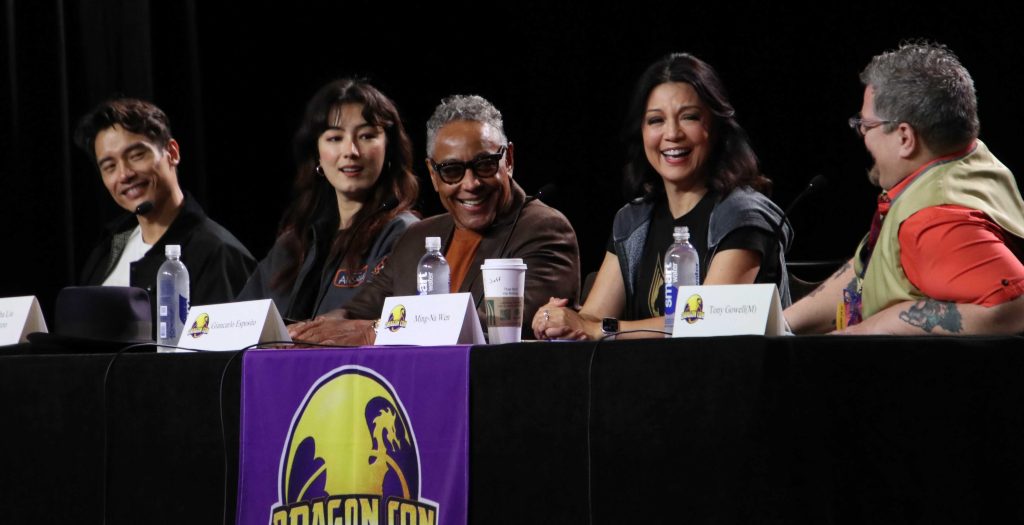
Sunday morning at 11:30AM in the Marriott Atrium Ballroom, the Star Wars track at Dragon Con welcomed Natasha Liu Bordizzo, Giancarlo Esposito, Manny Jacinto, and Ming-Na Wen for an hour-long Q&A. Moderated by Tony Gowell, the panel began with the sharing of Dragon Con love. Esposito proudly roared that he “loved” Atlanta, and as is often the case with first time guests, Bordizzo commented on both the quantity and quality of Dragon Con’s cosplay. The questions then got right to the business of discussing their interactions with the world of Star Wars.
When asked which character in the Star Wars universe other than their own was their favorite, Jacinto (Qimir in The Acolyte) without any hesitation said Darth Maul. Maul, the apprentice of Darth Sidius in Star Wars Episode I – The Phantom Menace, participated in what is arguably the franchise’s greatest light saber duel battling both Jedi master Qui Gon Jin and Obi-Wan Kenobi. According to Jacinto, that duel set the bar, and the production team of The Acolyte was determined to meet it. Esposito (Moff Gideon in The Mandalorian) pointed to Darth Vader. Here was a character shrouded in mystery, projecting power and dominance with every motion. Esposito took that concept of power into consideration as he developed the character of Gideon.
In preparing for his role as Moff Gideon, Esposito dove into the lore on other Moff’s in Star Wars, carefully considering Peter Cushing’s performance of Moff Tarkin in Star Wars Episode IV – A New Hope. Tarkin kept everything close to the vest and left the impression that he knew everything. As he considered his own portrayal of Gideon, Esposito had to understand the character. It was necessary to get at the reason, the rationale behind his actions. Esposito finally concluded that Gideon believed he had an opportunity to “right the ship.” This was, for him, an opportunity to “do it right.” As he explored Gideon further, Esposito realized that he was suffering, and “at some level in pain.” That pain originates in his failure to achieve self-validation. What angers Gideon is the fact that he’s not receiving the validation from others that he desperately needs. His inability to find internal validation leads him to seek it externally which will ultimately end in failure.
Jacinto, in considering Qimir, focused on the notion of the outsider. He argued that his character, like so many others, felt like an outcast. Qimir had to figure out how to deal with a world that doesn’t recognize him for who he was. Bordizzo argued that her character, Sabine Wren, also has unresolved pain that kept her from fulfilling her destiny. Wen argued that, with Fennec Shand, she had a character who was grounded in the canon. Her job was to create as much as she could with the material. Wen sees with Shand, much like the others, a character who is still trying to figure out who she is. Shand is a mercenary and assassin, but she lives according to her own moral code. It is Wen’s hope that Disney will decide to continue The Book of Boba Fett and give her the opportunity to see what develops.
When asked about costumes, the panel to a person spoke of the empowering nature of them. Esposito insisted that he have a cape which he “absolutely loved.” When Beskar armor got added, it forced him to both move and think differently. The costume kept his shoulders back and kept his body in line. The changed allowed him a “new route” to the character. Bordizzo felt that her character cutting her hair and donning her Mandalorian armor was a declaration that she was “ready.” In her case as well, moving from leather to armor changed her body language. Jacinto had a character who was primed for battle and determined to win. Playing fair was not an issue to him. Thus, his whole costume spoke of his power. Wen pointed out the importance of silhouettes in Star Wars. She wanted Shand to have a distinct and identifiable one.
When a member asked about aspiration, it gave Esposito (who admitted he hadn’t had any caffeine yet) the opportunity to reflect upon his career and the need for each of us to take ownership over our work and life. He always wanted to be an archaeologist and doesn’t rule out the possibility of doing it. We are used to seeing ourselves as having one career, but we need to be open to the possibility that it may be time to expand and change. He realized as an actor that there were stories he enjoyed and aspired to tell. Realizing that aspiration has led him to both produce and direct. It is important, Esposito believes, that we create our own destiny and claim ownership over our lives. As powerful as Esposito’s insight might be, it was Jacinto who officially received the “mike drop” award from Gowell when he answered the question of his aspiration by simply stating: “season 2 of The Acolyte.” After that hour, who needs caffeine???
